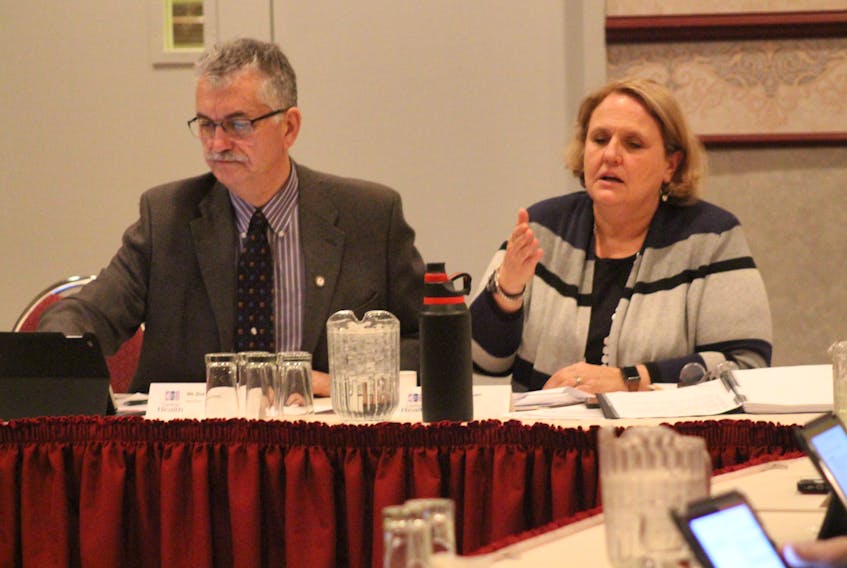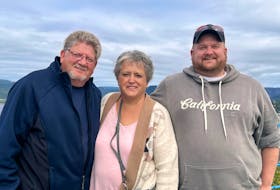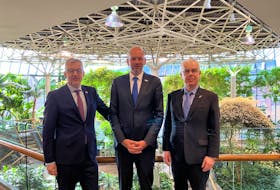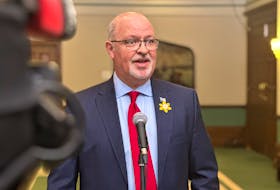GANDER, N.L. — Central Health has opened up about its work following a list of 36 recommendations issued in an external report to address the health authority’s governance and senior management last May.
Eight months after its release, 94 per cent of the recommendations have seen action, with 17 per cent of the recommendations implemented.
“It’s a step-by-step process, but I think to date the work has been rigorous, I believe our CEO and senior leadership has taken huge responsibility to see the recommendations are acted upon,” said Don Sturge, Central Health’s board of trustees chair, following the board’s public meeting in Gander Jan 22. “I feel there has been great progress in addressing the concerns that came to Dr. Vaughn.”
| Completed | In Progress | No Action | |
| There should be a full-time vice president of Medicine for the RHA. | Government incentivize collaboration between Grand Falls-Windsor and Gander. | Seek assistance from Memorial University Medical School to develop a Peer Support Network for Central Health physicians. | |
| Strengthen Community Advisory Committee relationship with the Board. | Work with Memorial University Medical School and the Newfoundland & Labrador Medical Association to offer courses in Professionalism and Ethics for medical staff. | Engage towns of Grand Falls-Windsor and Gander in joint planning session for health services. | |
| Paramedics responsible for security in Emergency Departments and Hospitals are not trained in security measures. | Update Central Health website. | ||
| Paramedics required to be stationed at “The Junction” have no bathroom facilities. | The board invest in governance training such as the Institute of Corporate Directors program. | ||
| Locate senior management offices equally between Grand Falls-Windsor and Gander facilities. | The board hold management accountable for measurable improvement in organizational culture civility and respect. | ||
| Infection Prevention and Control reports to management without senior authority to require clinical attention. | The board focus its role on oversight of management. | ||
| Amend board bylaws to open meetings to the public. | The board develop a communication strategy internally and to increase transparency in board making process. | ||
| All hiring should be posted and completed through Human Resources. | Senior leadership and CEO, individually and regularly engage staff. | ||
| A clinical management on-call system for point of care staff after-hours and on weekends. | Review the clinical management reporting structure to clarify accountability and reduce span of control. | ||
| There should be a full-time vice president of Medicine for the RHA. | Remove CEO as final authority for approval of credentialing and privileging of physicians. | ||
| All hiring should be posted and completed through Human Resources. | Longstanding individual Human Resources complaints symptomatic of the culture deficit. | ||
| Paramedics responsible for security in Emergency Departments and Hospitals are not trained in security measures. | Implement a primary health care collaborative care model of obstetrical care regionally. | ||
| Paramedics required to be stationed at “The Junction” have no bathroom facilities. | Human Resource leadership should make a concerted effort to be visible. | ||
| Locate senior management offices equally between Grand Falls-Windsor and Gander facilities. | Human Resource leadership should develop and implement a plan to be more visible to staff. | ||
| Infection Prevention and Control reports to management without senior authority to require clinical attention. | Engage the Community Advisory Committees in the development of a recruitment and retention strategy for healthcare professionals. | ||
| Amend board bylaws to open meetings to the public. | Engage Memorial University expertise to undertake a qualitative and quantitative evaluation of the Ottawa Model of Care focused on communication, patient safety and outcomes. | ||
| A clinical management on-call system for point of care staff after-hours and on weekends. | Develop and implement an evidence-based, data-driven long-term health human resources strategy for all health professions. | ||
| Devote at least one board meeting annually to risk assessment and risk mitigation. | Develop an evidenced based decision making tool for implementing change in clinical services | ||
| Develop a Patient Navigator position to assist patients and families chart their way through the healthcare system. | |||
| Develop a Central Health medical co-leadership model with the assistance of Memorial University Medical School and the Newfoundland and Labrador Medical Association (NLMA). | |||
| Combine Medical Advisory Committee into one Regional Medical Advisory Committee. | |||
| Central Health work with the Department of Health and Community Services to evolve a programmatic approach to clinical services. | |||
| All physician leaders should complete the Physician Manager Institute (PMI) leadership program. |
In taking on the recommendations, Sturge said there were some that could be acted upon immediately, while others required more work.
“But our goal is to see all of the recommendations are implemented and actioned,” he said.
The remaining six per cent that have seen no action are the result of ongoing work, Sturge said.
“You can’t do step two before step one is completed,” he said. “I can assure you as chair, what can be done and what can be actioned, has been actioned.”
Central Health has completion dates set for itself, but Sturge couldn’t speak to an end date.
“Each of the recommendations have different completion dates, and it wouldn’t be fair for me to arbitrarily choose a date at this point in time,” he said.
The public meeting was part of the report’s recommendation, and was the second of 10 slated for the health authority’s region.
"There’s action taking place, but we have to remember the Vaughn report was accepted and released by provincial government in May" - Percy Farwell
Sturge said the public component is similar to other board meetings in the past, however, sensitive issues are handled in-camera following the public meeting.
“All business of our board wouldn’t be all public business, that would be standard around legal matters,” said Sturge. “We want to ensure we bring due diligence to all of these matters, and obviously we need to respect privacy around HR issues.”
As engagement continues, he said, the board plans to listen and continue to be engaged with Central Health stakeholders.
“We want to address what comes to our attention and be responsive to the people we serve as a public board,” he said.
Observing
Gander Mayor Percy Farwell was one of less than a handful of people not affiliated with healthcare to take in the public meeting.
“It’s not unlike council meetings, really, where the public is welcomed to observe but not participate,” Farwell said. “I found it beneficial to be here to get a sense of the dynamics of the board and how it operates and the nature of the discussion.”
As a member of council, he did notice there was some discussion around committee reports, but not a whole lot, and he has had some concern that real issues are being dealt with away from the public sessions.
“I’m not suggesting there’s not a good reason for doing that, there are discussions that need to be had at the board level around issues the public should not be privy to at this point,” Farwell said.
“It was a relatively scripted meeting, the format not a whole lot different from council.
“There were a couple of presentations that were interesting, and trustees have made inquiries and have shown they have patient interest at heart, which is nice to see.”
And he is glad to see the public session, a recommendation from the external review, being acted upon.
However, Farwell was critical of the movement on the report.
“Yes, there’s action taking place, but we have to remember the Vaughn report was accepted and released by provincial government in May,” he said, reiterating six per cent still haven’t been acted on.
But he did cut the board some slack, stating that without seeing the details or the overview of the progress, it’s difficult to judge, as the progress report wasn’t made available to the public at that time.
Related: Gander pleased with outcome of the Central Health external review
Tell us what you think!
Write us a letter to the editor and email it to [email protected]. Be sure to include a name, address and daytime telephone number where the author can be contacted. Letters should be no more than 300 words.









